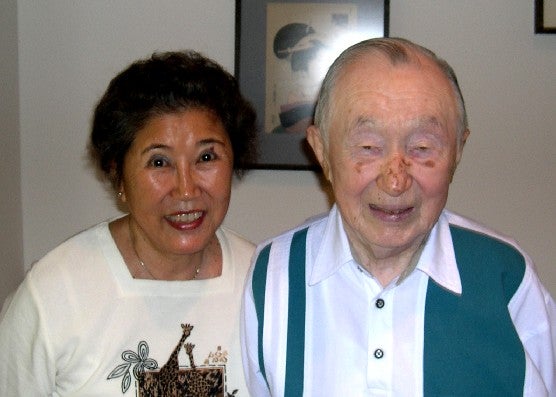Hiroshi "Hootch" and Chiyo "Cherry" Okumura

In 1906, Yozaemon Okumura, a native of Oshima Island, Yamaguchi Prefecture, went to the US to work on railroad and farming, leaving behind his wife and first son, Kioji. After Yozaemon earned enough money, the family reunited in the US in 1912, and soon after, in 1913, Hiroshi Okumura was born in Laguna, California. He gained his nickname “Hootch” in primary school, which would stick with him for the rest of his life. In 1929, Hiroshi’s parents returned to Japan since Kioji wanted to go into retail rather than help Yozaemon on the farm, thus the two brothers remained in the US.
In April 1942, Hiroshi married Chiyo “Cherry” Murata. Earlier that year, they had left Southern California to a city named Porterville with the hopes of escaping internment, but eventually, they were sent to Poston Relocation Center in Arizona right after their marriage. Later, as Colorado Governor Ralph Carr offered refuge to Japanese Americas, the couple took off for Denver and Hiroshi took a job packing and shipping produce. Afterwards, the couple went through many businesses: they owned a bowling alley, then a shopping center, then a container company that made crates for produce.
Eventually, they moved to Houston in 1989 to be closer to their daughter, Ellen. The couple enjoyed playing golf and bowling with the Japanese American community in Houston. In 2007, Hiroshi passed away, and it is said that he wished to have his ashes scattered his favorite fishing area in Wyoming and along Interstate 45, going to Colorado. Below is an article further detailing the Okumuras' life.
Hiroshi "Hootch" and Cherry Okumura
David Sugimoto, April 1999 issue of "Inside the Houston Caper"
Hiroshi “Hootch” Okumura was born in 1913 near Laguna, California. “It’s not there any more,” he says. “It has long since been overtaken by Los Angeles.,” His parents came from Yamaguchi-ken, from Oshima Island between southern Honshu and Shikoku. Like many other Issei, Hootch’s father, Yozaemon, came over first in 1906, leaving his mother and older brother, Kioji, behind until he could save money for passage, working on the railroad and farming. They were reunited in 1912.
In 1929, when Hootch was about 14, his parents returned to Japan leaving him in care of Kioji who was then 27. “Kioji wanted to get into the retail business so there was no one to help my father on the farm so he retired at 53 and went back to Japan.”
Hootch and Kioji ran a fruit and vegetable stand near the farm until the war started. “Mr. Knott of Knott’s Berry Farm used to buy from us. What fruit he couldn’t sell, Mrs. Knott would bake into pies and sell. That how they got started.” Hootch graduated form Excelsior High School in 1931, when the cities of Norwalk and Artesia had to share a high school.
Kioji had a friend whom he would visit and Hootch, being the younger brother, would tag along. Next door to his brother’s friends lived the Muratas. Now the Muratas had a two-year old daughter name Chio. Hootch kept his eye on her until 1942 when they were married. (Cherry couldn’t confirm the story but admits it sounds good). Incidentally, for those who are curious about how Hootch got his nickname: “In fourth or fifth grade, one of the Swedish kids couldn’t pronounce “Hiroshi” so it came out “Hootch” and it stuck ever since.”
At the outset of WWII, Hootch left southern California on March 31, 1942, the last day Japanese and Japanese Americans were allowed to travel. Hootch took Cherry to Porterville, California, in the hopes of escaping internment by moving into the “B” zone, east of the road which has since become Interstate 5. Within three weeks they were told Zone B would be evacuated and they couldn’t leave the area. On April 13 (Happy 59th Anniversary kids!) they married before being sent to Poston Relocation Center near Parker, Arizona.
After a little more than a year, a friend brought Hootch his truck and he and Cherry took off for Denver. Then Colorado Governor Carr offered refuge to Japanese Americans and a friend, Henry Yamaga, offered them sponsorship. Unfortunately, he didn’t have a job for them so Hootch took a job with a produce supplier, eventually supervising 12-15 people, packing and shipping fruits and vegetables. After the war, the business started to go downhill. “Colorado produce was inferior and once the war was over, they couldn’t sell it.” In 1955, Hootch and Cherry bought a bowling alley and a year later, bought the shopping center around it and owned it until 1963.
Using the money from the shopping center, they bought a container company that manufactured crates for the produce industry. They owned the company until 1975 when they decided they’d had enough and sold it to work on golf and bowling. They moved to Houston in 1989 to be closer to daughter, Ellen, a graduate of Metropolitan State University in Denver and part-time insurance adjuster.
Hootch says he picked up golf from his older brother who learned to play golf in the Gila River Camp. However, Hootch and Cherry’s first passion is bowling. They still drive cross country to bowling tournaments. Hootch is the only surviving member of the 1947 JACL Bowling League and represents Texas in the Senior Olympics. Says Hootch, “I chase bowling. At my age bowling is easier than golf. Golf is kind of a hardship because I keep getting worse and worse.”
